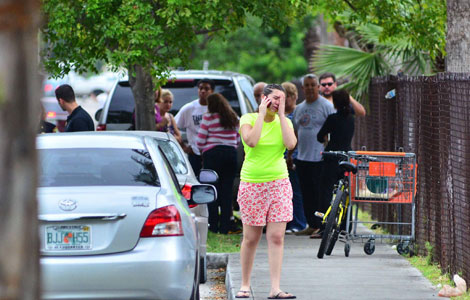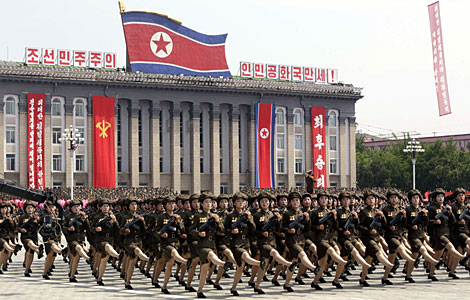Israeli-Palestinian peace talks to resume
Updated: 2013-07-29 07:31
(Agencies)
|
||||||||
WASHINGTON/JERUSALEM - Israel and the Palestinians plan to resume peace negotiations this week for the first time in nearly three years after an intense effort by US Secretary of State John Kerry to bring them back to the table.
The talks are scheduled to resume in Washington on Monday evening and on Tuesday and will be conducted by senior aides to Israeli Prime Minister Benjamin Netanyahu and Palestinian President Mahmoud Abbas, the State Department said.
"Both leaders have demonstrated a willingness to make difficult decisions that have been instrumental in getting to this point. We are grateful for their leadership," Kerry said in a statement.
Middle East analysts voiced skepticism that the talks might lead to a peace treaty to end the more than six-decade conflict that has defied two decades of U.S. efforts to broker a solution.
Still, the resumption of negotiations is a rare moment of good news in the Middle East for the Obama administration, which has struggled to formulate a policy to try to end the civil war in Syria or to facilitate a democratic transition in Egypt.
Even getting the Israelis and the Palestinians to agree to resume talks required great effort by Kerry, who made six peace-making trips to the region in the last four months - an unusual amount of time - to coax them back.
The last piece of the puzzle came together when the Israeli Cabinet on Sunday approved the release of 104 Palestinian prisoners, with 13 ministers voting for the release, seven against and two abstaining, an Israeli official said.
Obama's involvement needed?
The last round of direct negotiations broke down in late 2010 in a dispute over Jewish settlement construction in the West Bank, land that Israel seized in a 1967 war, along with the Gaza Strip, which the Palestinians want for a state.
It is unclear how the United States hopes to bridge the core issues in the dispute, including borders, the future of Jewish settlements on the West Bank, the fate of Palestinian refugees and the status of Jerusalem.
While commending Kerry for his determination, Shibley Telhami, Anwar Sadat Professor for Peace and Development at the University of Maryland, said President Barack Obama would have to get involved if the talks were ultimately to succeed and the United States would have to offer its own ideas for a solution.
"At some point, the central player in this saga is not going to be Netanyahu, it's not going to be Abu Mazen (Abbas), it's not going to be John Kerry, it's going to be Barack Obama," he said. "So far, it's not clear that ... the president is prepared to take the kind of risk that would move this forward."
In a statement, State Department spokeswoman Jen Psaki said initial talks were planned for Monday evening - Israeli media said these would take place over dinner at Kerry's home - and on Tuesday.
Psaki suggested the round of talks in Washington would be to chart a path forward, rather than to leap directly into the thorny issues that need to be resolved.
After his latest round of shuttle diplomacy, Kerry announced on July 19 in Amman, Jordan, that the parties had laid the ground to resume negotiations on the so-called "final status" issues that must be resolved to end the dispute.
"The meetings in Washington will mark the beginning of these talks," Psaki said. "They will serve as an opportunity to develop a procedural work plan for how the parties can proceed with the negotiations in the coming months."
Prisoner deal
Earlier on Sunday, Netanyahu had urged divided rightists in his Cabinet to back the prisoner deal.
"This moment is not easy for me, is not easy for the Cabinet ministers, and is not easy especially for the bereaved families, whose feelings I understand," he said when the Cabinet met, referring to families who have lost members in militant attacks.
"But there are moments in which tough decisions must be made for the good of the nation and this is one of those moments."
Israeli Channel 1 television said prisoners would be released in three stages, depending on progress in the talks, with a group of Israeli citizens left until the last stage.
Abbas has demanded the release of prisoners held since before a 1993 interim peace accord took effect. Israel has jailed thousands more Palestinians since then, many for carrying out deadly attacks.
The prisoner release would allow Netanyahu to sidestep other Palestinian demands, such as a halt to Jewish settlement expansion and a guarantee that negotiations over borders will be based on boundaries from before the 1967 Middle East war, when Israel captured the West Bank, Gaza Strip and East Jerusalem.
Hundreds of protesters from the Popular Front for the Liberation of Palestine (PFLP) staged a rally against the resumption of peace talks, clashing with police in the West Bank city of Ramallah, the seat of Abbas's Palestinian Authority.
PFLP activists also demonstrated in Gaza and chanted: "Listen Abbas, our land is not for sale. ... The (Palestinian) cause will never be resolved except by the rifle."
Aaron David Miller, a former U.S. peace negotiator who works for the Woodrow Wilson International Center for Scholars think tank in Washington, said he was impressed by Kerry's tenacity.
"He has invested so much in this now, and even through expectations are so low, he is in an investment trap, he really can't let it fail now," Miller said. "Which means he'll have to go to extreme lengths to keep this thing afloat."

 Asiana crash victims' ashes returned to relatives
Asiana crash victims' ashes returned to relatives
 7 killed in Florida shooting spree
7 killed in Florida shooting spree
 Sun Yang takes gold in 400m freestyle
Sun Yang takes gold in 400m freestyle
 Six dead, 12 missing in landslides, floods
Six dead, 12 missing in landslides, floods
 Complaints spike over subpar baby formula imports
Complaints spike over subpar baby formula imports
 EU solar trade dispute diffused
EU solar trade dispute diffused
 Deliveries up as mercury rises
Deliveries up as mercury rises
 DPRK stages military parade
DPRK stages military parade
Most Viewed
Editor's Picks

|

|

|

|

|

|
Today's Top News
Pakistan condemns latest US drone strike
Experts advise CEOs on how to make it in the US
Israeli-Palestinian peace talks to resume
Latest US-China talks should smooth the way
Audit targets local government debt
30 people killed in Italy coach accident
Brain drain may be world's worst
Industry cuts cloth to measure up to buyers' needs
US Weekly

|

|







